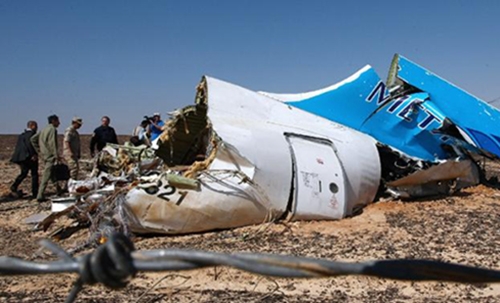Egypt's Sisi says Russian plane downed by 'terrorism'
Egyptian President Abdel Fattah el Sisi acknowledged for the first time on Wednesday that "terrorism" caused a Russian plane crash in the Sinai Peninsula in October that killed 224 people.
"Has terrorism ended? No... Whoever downed that plane, what did he want? Just to hit tourism? No. To hit relations. To hit relations with Russia," Sisi said in a speech.
Sisi had previously dismissed as "propaganda" a claim by the Islamic State (IS) jihadist group that it downed the airliner on October 31.
The group said it smuggled a bomb on board the plane in the airport of Sharm el-Sheikh, a Sinai resort popular with Russian holidaymakers.
Russia had quickly concluded that a bomb brought down the airliner, and suspended flights to Egypt. Britain also stopped flights to Sharm el-Sheikh.
The attack dealt a major setback to Sisi, who had been at pains to revive the country's tourism industry and impose control over the restive Sinai Peninsula.
Jihadists there have killed hundreds of policemen and soldiers since Sisi, then army chief, overthrew Islamist president Mohamed Morsi in 2013.
Egypt has set up a committee to investigate the attack, and previously insisted it be allowed to finish its probe before any conclusions were made.
Egyptian media outlets have dismissed suggestions that a bomb was the cause as part of a Western "conspiracy" aimed at harming the country's tourism sector.
The A321 airliner, operated by Russia's Metrojet and bound for Saint Petersburg, broke up mid-air over the Sinai, minutes after take-off.
The wreckage fell several kilometres (miles) across North Sinai -- the bastion of the Egyptian branch of IS.
The group said it bombed the plane in revenge for Russian air strikes in Syria.
- Tourism battered -
On November 17, Russia's President Vladimir Putin announced that Russian investigators had found evidence of a bomb on board, and vowed to punish the attackers.
"We will search for them anywhere they might hide. We will find them in any part of the world and punish them," he said.
Russian security chief Alexander Bortnikov said the passenger jet was brought down by a bomb with a force equivalent to one kilogram (two pounds) of TNT.
Egypt has since hired a British firm to review security at airports, including procedures to check passengers and baggage, and security equipment in the airport.
Millions of tourists, mostly Britons and Russians, flock to Sharm el-Sheikh and other Egyptian resorts attracted by its beaches, warm weather and diving sites.
In November and December, the tourism sector lost 2.2 billion Egyptian pounds ($280 million) a month primarily due to the Russian and British flight bans.
Overall tourist arrivals fell sharply in 2015 to about 9.3 million, from 15 million in 2010. Revenues from tourism slumped 15 percent year-on-year to $6.1 billion in 2015.
Tourism had never recovered after an 18-day uprising unseated veteran president Hosni Mubarak in early 2011, setting off months of unrest.
Following Mubarak's overthrow, Morsi won a presidential election in 2012, but lasted only a year in office before the military toppled him as millions protested against the Islamist.
His overthrow unleashed a police crackdown on Islamists that left hundreds dead and thousands in prison.
Related Posts

